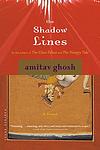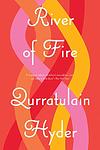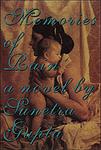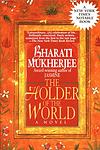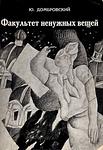The Greatest Russian, Indian "Fiction, Social & Cultural Fiction" Books Since 1950
Click to learn how this list is calculated.
This list represents a comprehensive and trusted collection of the greatest books. Developed through a specialized algorithm, it brings together 300 'best of' book lists to form a definitive guide to the world's most acclaimed books. For those interested in how these books are chosen, additional details can be found on the rankings page.
Genres
Social & Cultural Fiction is a literary category that encompasses novels and stories that delve into the complexities of society and culture, exploring themes such as class, race, gender, and identity within specific social contexts. These narratives often provide a lens through which readers can examine the intricacies of human relationships and the impact of cultural norms and societal structures on individuals and communities. By offering a fictional yet reflective portrayal of real-world social dynamics, this genre invites readers to gain a deeper understanding of the diverse experiences that shape our world. Authors in this category frequently use their characters and settings to comment on contemporary issues, challenge prevailing ideologies, and provoke thought about the possibility of social change, making Social & Cultural Fiction a powerful tool for empathy and a mirror for the ever-evolving human condition.
Countries
Date Range
Reading Statistics
Click the button below to see how many of these books you've read!
Download
If you're interested in downloading this list as a CSV file for use in a spreadsheet application, you can easily do so by clicking the button below. Please note that to ensure a manageable file size and faster download, the CSV will include details for only the first 500 books.
Download-
1. Midnight's Children by Salman Rushdie
The novel tells the story of Saleem Sinai, who was born at the exact moment when India gained its independence. As a result, he shares a mystical connection with other children born at the same time, all of whom possess unique, magical abilities. As Saleem grows up, his life mirrors the political and cultural changes happening in his country, from the partition of India and Pakistan, to the Bangladesh War of Independence. The story is a blend of historical fiction and magical realism, exploring themes of identity, fate, and the power of storytelling.
-
2. Doctor Zhivago by Boris Pasternak
Set against the tumultuous backdrop of the Russian Revolution, the book follows the life of a physician and poet, Yuri Zhivago, as he navigates the political and social upheaval of the early 20th century. Torn between his love for two women, his wife Tonya and his passionate mistress Lara, Zhivago's personal struggles mirror the larger societal changes occurring around him. The novel explores themes of love, war, and the human spirit, offering a poignant and complex portrait of life during a time of revolutionary change.
-
3. One Day in the Life of Ivan Denisovich by Aleksandr Solzhenitsyn
This novel provides a detailed account of a single day in the life of a prisoner, Ivan Denisovich, in a Soviet labor camp in the 1950s. The narrative follows Ivan as he navigates the harsh realities of his daily routine, from the moment he wakes up to when he goes to bed. The book provides a stark portrayal of the brutality and inhumanity of the Soviet gulag system while also highlighting the resilience and dignity of the human spirit under such oppressive conditions.
-
4. The God of Small Things by Arundhati Roy
This novel is a poignant tale of fraternal twins, a boy and a girl, who navigate through their childhood in Kerala, India, amidst a backdrop of political unrest and societal norms. The story, set in 1969, explores the complexities of their family's history and the tragic events that shape their lives. Their mother's transgression of caste and societal norms by having an affair with an untouchable leads to disastrous consequences, revealing the oppressive nature of the caste system and the destructive power of forbidden love. The novel also delves into themes of postcolonial identity, gender roles, and the lingering effects of trauma.
-
5. A Fine Balance by Rohinton Mistry
"A Fine Balance" is a poignant narrative set in India during the 1970s, a time of political turmoil and upheaval. The plot revolves around four diverse characters - a widow, a young student, and two tailors - who are brought together by fate. Through their interconnected lives, the book explores themes of caste, poverty, political corruption, and the human spirit's resilience. It offers a profound exploration of the delicate balance that sustains life amidst adversity.
-
6. Life and Fate by Vasily Grossman
"Life and Fate" is a sweeping epic that explores the human condition during the Siege of Stalingrad in World War II. The novel delves into the lives of a wide range of characters, from soldiers and scientists to children and victims of the Holocaust, providing a stark and unflinching portrayal of the horrors of war, the brutality of totalitarianism, and the resilience of the human spirit. At the same time, it also examines themes of love, loss, and the struggle for freedom and dignity in the face of overwhelming adversity.
-
7. Nectar in a Sieve by Kamala Markandaya
"Nectar in a Sieve" is a tale of an Indian peasant woman named Rukmani who endures the hardships of rural poverty, natural disasters, and personal tragedy, while trying to raise her children and maintain her marriage. The book explores themes of love, hope, and the strength of the human spirit against the backdrop of a rapidly changing India. Despite the constant struggles, Rukmani never loses her faith and hope, symbolizing the resilience and strength of ordinary people in the face of adversity.
-
8. Kolyma Stories by Varlam Shalamov
"Kolyma Stories" is a collection of short stories that vividly depict the harrowing experiences of prisoners in the Soviet Gulag during the Stalinist era. Written by Varlam Shalamov, a survivor of the Kolyma labor camps himself, the book offers a raw and unflinching portrayal of the inhumane conditions, extreme suffering, and moral degradation endured by the prisoners. Through his powerful and haunting narratives, Shalamov sheds light on the resilience of the human spirit and the indomitable will to survive amidst unimaginable cruelty.
-
9. Cancer Ward by Aleksandr Solzhenitsyn
"Cancer Ward" is a poignant novel set in a Soviet cancer hospital in the mid-1950s. It follows the lives and struggles of patients and doctors, exploring their personal histories, relationships, and the political environment of the time. The hospital serves as a metaphor for the oppressive Soviet state, with cancer symbolizing the malignant growth of totalitarianism. The book also explores themes of mortality, the human spirit, and the will to survive.
-
10. Heat and Dust by Ruth Prawer Jhabvala
"Heat and Dust" is a novel set in two different time periods in India, exploring themes of colonialism, gender roles, and cultural clash. The story alternates between the 1920s, following the scandalous life of Olivia, an English colonial wife who falls in love with an Indian prince, and the 1970s, where her step-granddaughter journeys to India to uncover the truth about Olivia's life and her own identity. The narrative exposes the complexities of love, culture, and identity in the context of British colonial rule and post-colonial India.
-
11. Clear Light of Day by Anita Desai
"Clear Light of Day" is a novel set in Old Delhi, which explores the dynamics of the Das family. The story shifts back and forth in time, reflecting on the lives of siblings Bim, Raja, Baba, and Tara, and their relationships with each other and their aunts. The narrative delves into themes of memory, time, and decay, as well as the political upheaval of the Partition of India. The novel is a poignant study of family relationships, personal change, and loss.
-
12. The White Tiger by Aravind Adiga
"The White Tiger" is a darkly humorous novel set in modern-day India that explores the country's class struggle through the eyes of an ambitious and cunning protagonist. Born in a poor village, he moves to Delhi to work as a chauffeur for a rich family. He eventually breaks free from his life of servitude by committing an act of shocking violence, and uses his newfound freedom to become a successful entrepreneur in Bangalore. The story, told through a series of letters written to the Chinese Premier, is a scathing critique of India's social and economic disparities, and the corruption that permeates all levels of society.
-
13. The River Sutra by Gita Mehta
"The River Sutra" by Gita Mehta is a captivating novel that explores the intertwining lives of various characters along the sacred river Narmada in India. Through vivid storytelling and rich descriptions, the book delves into themes of spirituality, love, and the search for meaning in life. As the characters embark on journeys of self-discovery, the river serves as a powerful metaphor for the flow of life and the interconnectedness of all beings. With its lyrical prose and thought-provoking narrative, "The River Sutra" offers a profound exploration of the human experience and the timeless wisdom of ancient traditions.
-
14. The Clay Machine-gun by Victor Pelevin
"The Clay Machine-gun" is a surreal and complex novel that explores the nature of reality and illusion. The story is set in post-Soviet Russia and follows a protagonist who has multiple identities, including a poet in 19th-century Russia, a 20th-century psychiatric patient, and a 21st-century advertising executive. The narrative moves between these identities and realities, blurring the lines between them and creating a layered and philosophical exploration of Russian society, identity, and the human psyche.
-
15. The Inheritance of Loss by Kiran Desai
This novel explores themes of love, loss, and the human struggle for identity amidst political unrest. Set in India during the Nepalese movement for an independent state, the narrative follows the lives of a retired judge living in the Himalayas, his granddaughter, and his cook. As the political situation worsens, each character must grapple with their own personal issues, including the judge's regret over his failed marriage and his granddaughter's struggle to find her place in the world. The cook, meanwhile, dreams of a better life for his son in the United States. The narrative weaves together these individual stories to create a poignant tapestry of human resilience in the face of adversity.
-
16. The Shadow Lines by Amitav Ghosh
"The Shadow Lines" is a novel that explores themes of memory, family, and national identity through the eyes of a young boy and his experiences growing up in Calcutta, India. The narrative is framed by two major historical events: the 1964 Dhaka Riots and the 1942 World War II. The protagonist's relationships with his family and his personal experiences are juxtaposed with these events, highlighting the complexities of identity, memory, and the lasting impacts of historical events on individual lives. The novel also delves into the arbitrary nature of national borders and the shadow lines they draw between people and their histories.
-
17. Happy Moscow by Andrey Platonov
"Happy Moscow" is a satirical novel set in the Soviet Union during the height of Stalinist rule, following the life of a young woman, Moscow Chestnova, who is named after the capital city. Despite the harsh realities of life under an authoritarian regime, she maintains a positive and optimistic outlook, symbolizing the Soviet Union's propaganda that promoted an image of a happy and prosperous society. The novel, through its characters and their experiences, explores the paradoxes and contradictions of the Soviet society, challenging the official narrative of happiness and prosperity.
-
18. The Golden Gate by Vikram Seth
Set in the 1980s, the novel follows the life of a group of friends living in San Francisco. The protagonist, a successful yet lonely executive, is persuaded by his former girlfriend to place a personal ad, leading to a relationship with a musician. The narrative delves into their relationship, their friends' lives, and the various complications they face, including issues of love, friendship, sexuality, and death. The unique aspect of this book is that it is written entirely in verse, specifically in sonnet form.
-
19. River of Fire by Qurratulain Hyder
"River of Fire" is an expansive novel that spans over 2,500 years of Indian history. The narrative unfolds through the intertwined lives of four characters who are reincarnated in different eras: a Buddhist monk in 400 B.C., a court poet in the Mughal Empire, a British colonial administrator, and a modern Indian intellectual. This literary masterpiece is a reflection on the cyclical nature of history, the continuity of life and the human spirit, and the eternal quest for freedom and identity, providing a panoramic view of the socio-political evolution of the Indian subcontinent.
-
20. Sofia Petrovna by Lydia Chukovskaya
The book is a poignant narrative set during the Stalinist purges of the 1930s in the Soviet Union. It follows the story of a loyal and hardworking widow who is confronted with the brutal reality of the regime when her beloved son is arrested on false charges. As she navigates the Kafkaesque bureaucracy to seek justice for her son, her faith in the government and its policies is shattered. The novel offers a harrowing look at the terror of the Great Purge and the impact of political oppression on the lives of ordinary citizens, as the protagonist grapples with the disintegration of her world and the moral dilemmas posed by a society steeped in fear and denunciations.
-
21. Memories of Rain by Sunetra Gupta
The novel explores the crumbling marriage of a Bengali woman and her Greek husband. The narrative alternates between Kolkata, India, and London, England, and spans over a decade, capturing the protagonist's emotional turmoil, her struggle to reconcile her Indian heritage with her Western lifestyle, and her eventual decision to leave her unfaithful husband. The novel is rich in poetic language and imagery, and it delves deep into themes of identity, cultural displacement, and the complexities of love and betrayal.
-
22. The Burn: A Novel in Three Books : (late Sixties--early Seventies) by Vassily Aksyonov
"The Burn: A Novel in Three Books : (late Sixties--early Seventies)" is a historical novel that explores the cultural and political landscape of the Soviet Union during the late 1960s and early 1970s. The book follows a group of intellectuals, artists, and dissidents who are striving to preserve their individuality and freedom in a society that is increasingly oppressive and conformist. The narrative is punctuated by surreal and fantastical elements, reflecting the characters' struggle to maintain their sanity and dignity in a world that seems to be spiraling into madness.
-
23. Holder of the World: A Novel by Bharati Mukherjee
The novel explores the life of Hannah Easton, a woman born in 17th century Salem, who gets married to a British adventurer and travels to India. In India, she becomes the concubine of a local ruler and takes on the name "The Holder of the World". The story is narrated by a 20th-century woman who discovers Hannah's story through a virtual reality device. The narrative weaves together the historical and the contemporary, the East and the West, and the real and the virtual, to create a rich tapestry of a woman's life and the cultural clashes she experiences.
-
24. The Faculty of Useless Knowledge by Yuri Dombrovsky
"The Faculty of Useless Knowledge" delves into the life of a historian caught in the oppressive atmosphere of Stalinist Russia. The narrative explores the intellectual and emotional turmoil of the protagonist, who is ensnared in the brutal machinery of the Soviet state's ideological and bureaucratic control. Through his experiences and reflections, the book examines themes of memory, history, and the struggle to maintain intellectual integrity in a repressive society. The protagonist's journey is a poignant commentary on the value of knowledge and the human spirit's resilience against totalitarian forces.
-
25. Wife by Bharati Mukherjee
The novel explores the complexities of an arranged marriage through the eyes of a young Indian woman who relocates to New York City after marrying a man she barely knows. Thrust into a foreign culture, she struggles with her identity and the expectations placed upon her as a wife. As she navigates her new life, she faces the challenges of isolation and the pressures of traditional roles, which ultimately lead to a dramatic transformation in her character and worldview. Her journey is a poignant examination of the immigrant experience, the clash of cultures, and the personal quest for self-realization amidst societal constraints.
Reading Statistics
Click the button below to see how many of these books you've read!
Download
If you're interested in downloading this list as a CSV file for use in a spreadsheet application, you can easily do so by clicking the button below. Please note that to ensure a manageable file size and faster download, the CSV will include details for only the first 500 books.
Download














